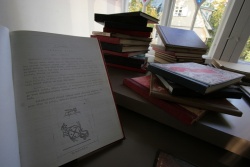Difference between revisions of "Translation and the publishing of Buddhist books and texts by Taola"
(Created page with "thumb|250px| The Brotherhood and faith-followers translated dozens of books, which were multiplied through hundreds of exemplars; also a remarkable...") |
|||
| Line 1: | Line 1: | ||
[[File:Books_by_taola.jpg|thumb|250px|]] | [[File:Books_by_taola.jpg|thumb|250px|]] | ||
| − | The Brotherhood and faith-followers translated dozens of books, which were multiplied through hundreds of exemplars; also a remarkable library was founded, in which most of the texts were from Buriatya. They translated 20 books, and bound and copied more than 40 books into hundreds of exemplars. As it was impossible to publish religious literature officially, they bound and copied books by hand-typing them. All of this work was done for free. | + | The Brotherhood and faith-followers translated dozens of [[books]], which were multiplied through hundreds of exemplars; also a remarkable library was founded, in which most of the texts were from Buriatya. They translated 20 [[books]], and bound and copied more than 40 [[books]] into hundreds of exemplars. As it was impossible to publish [[religious]] {{Wiki|literature}} officially, they bound and copied [[books]] by hand-typing them. All of this work was done for free. |
| − | To also get literature from Western countries, several foreigners were asked to help, and they brought suitcases full of Buddhist literature, helping to establish Estonian Buddhism. The Finnish writer Harri Sirola wrote about the Taola phenomenon in Finnish newspapers and later published the novel Two Cities, based on the life of Väärtnõu. | + | To also get {{Wiki|literature}} from Western countries, several foreigners were asked to help, and they brought suitcases full of [[Buddhist]] {{Wiki|literature}}, helping to establish Estonian [[Buddhism]]. The Finnish writer Harri Sirola wrote about the Taola [[phenomenon]] in Finnish newspapers and later published the {{Wiki|novel}} Two Cities, based on the [[life]] of Väärtnõu. |
| − | Buddhist education was provided by Vello Väärtnõu, who led all Brotherhood activities and carried out the first Buddhist rituals. The Tibetan and Old–Mongolian languages were taught by Pent Nurmekund from the University of Tartu, who at the same time established the Oriental Studies department in Tartu University. Additional education was provided by different language schools and, in addition, Taola started compiling the first Estonian book in Tibetan language studies. | + | [[Buddhist]] [[education]] was provided by [[Vello Väärtnõu]], who led all Brotherhood [[activities]] and carried out the first [[Buddhist]] [[rituals]]. The [[Tibetan]] and Old–Mongolian [[languages]] were taught by Pent Nurmekund from the {{Wiki|University of Tartu}}, who at the same [[time]] established the {{Wiki|Oriental}} Studies department in Tartu {{Wiki|University}}. Additional [[education]] was provided by different [[language]] schools and, in addition, Taola started compiling the first Estonian [[book]] in [[Tibetan language]] studies. |
{{R}} | {{R}} | ||
Latest revision as of 05:12, 17 September 2013
The Brotherhood and faith-followers translated dozens of books, which were multiplied through hundreds of exemplars; also a remarkable library was founded, in which most of the texts were from Buriatya. They translated 20 books, and bound and copied more than 40 books into hundreds of exemplars. As it was impossible to publish religious literature officially, they bound and copied books by hand-typing them. All of this work was done for free.
To also get literature from Western countries, several foreigners were asked to help, and they brought suitcases full of Buddhist literature, helping to establish Estonian Buddhism. The Finnish writer Harri Sirola wrote about the Taola phenomenon in Finnish newspapers and later published the novel Two Cities, based on the life of Väärtnõu.
Buddhist education was provided by Vello Väärtnõu, who led all Brotherhood activities and carried out the first Buddhist rituals. The Tibetan and Old–Mongolian languages were taught by Pent Nurmekund from the University of Tartu, who at the same time established the Oriental Studies department in Tartu University. Additional education was provided by different language schools and, in addition, Taola started compiling the first Estonian book in Tibetan language studies.
